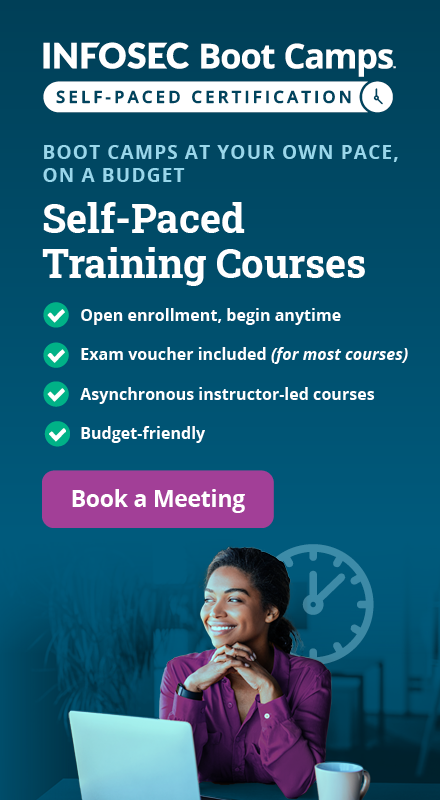Know what you’re buying: What’s included?
It sounds like common sense, but many admins and managers rush into purchasing the first boot camp they come across without understanding what they’re getting. Not all programs are created equal, so doing your due diligence upfront is critical.
FREE role-guided training plans
Get 12 cybersecurity training plans — one for each of the most common roles requested by employers.
Before signing your team members up, ensure you can clearly grasp what the boot camp includes and the outcomes they can reasonably expect. Failing to research thoroughly could lead to unpleasant surprises like:
- Lack of alignment: You want the course to align with your company’s goals. For instance, if your company wants to expand its use of the cloud, you may sign off on a CompTIA Cloud+ Boot Camp. But if your company focuses more on the AWS environment, an AWS Certified Solutions Architect Boot Camp may be a better choice.
- Wasted resources: It’s a common mistake to purchase individual boot camps for employees instead of looking into group discounts. Be sure to investigate the savings you can get by combining several employee trainings into one purchase.
- Lackluster training: On day one, your team excitedly shows up only to find the instructor simply reading verbatim from PowerPoint. Disappointing, right? To ensure they learn the skills they need and get the expected outcomes, review testimonials from prior attendees and case studies to gauge the teaching quality and interactivity you can expect.
A boot camp for your team represents a significant investment, so partner with a reputable provider that delivers on its promises. Evaluate the expected outcomes carefully. Will your team emerge prepared to pass their certifications while also gaining applicable job skills? The best programs go beyond the test, contextualizing concepts through real-world scenarios.
Also, research the provider’s guarantees and policies. Can your team members repeat the course or exam at no extra cost? Clarify all the fine print to safeguard your investment and set everyone up for success.
Ensure your team is prepared before their boot camp
A three- to seven-day boot camp isn’t designed to take learners from zero knowledge to certification mastery. Those dramatic leaps are best left to longer, immersive programs. However, a little pre-boot camp preparation can go a long way in setting your team up for success. Here are some things to keep in mind as you strive to support your team so they can hit the desired outcomes:
- Make sure your team completes pre-boot camp materials: If the boot camp has prep materials, ensure your team members are utilizing them so they can maximize their chances of success and get the most out of your investment.
- Work prep discussions into 1-on-1 meetings: You should infuse your team’s prep into your workplace culture by weaving it into 1:1 discussions. This keeps their prep top of mind and underscores its value for your organization.
- Review the exam outlines: Most exams have published outlines that detail the specific topic and skills your team will be tested on. Set up times to review these with your team members. This ensures they have a prep road map and focus their energies on the right areas.
“Before attending your boot camp, I recommend going through the pre-study materials and getting familiar with the material,” says Julian Tang, Chief Information Officer at Tennenbaum Capital Partners and Infosec CISSP Boot Camp student. “If you have the time, also take a few of the practice tests. Reviewing material in advance means you don’t have to work as hard when you are at the boot camp.”
Help your team clear their work schedule
A manager can really hinder an employee if they don’t give them the space in their work schedule to study. Boot camps are designed for intense training, cramming a significant amount of information into a short timeframe. To absorb the material and succeed on their exams, your team must be dedicated. This means you’ll have to clear their schedule to create dedicated study time during boot camp. And since you’re sponsoring their training, making sure their duties get covered falls in your court during the boot camp.
In the Infosec webinar, Inside an Infosec Boot Camp, experienced cybersecurity instructor Tommy Gober advises students to set away messages and communicate boundaries by telling supervisors that they need real-time away from the office: “Make your job that week learning the material.”
FREE role-guided training plans
Get 12 cybersecurity training plans — one for each of the most common roles requested by employers.
Gober recommends allocating at least an hour or 90 minutes per day outside of classroom hours to review materials and complete practice work. “Block off your calendar, clear any meetings, minimize distractions, get away from the office if you can, get away from home,” says Gober. You need to focus on your learning.
Infosec instructor Rod Evans goes even further when he half-jokingly suggests that students “lock themselves in the basement for a few hours each day” to create the ideal study sanctuary and completely disappear from typical workplace or household demands. As Evans reminds students, “We give you things to study. Allocate time to study. You have to find time for your education.”
Consider training as a team
Team training can help amplify your team’s success, especially if several employees enroll in the same program. It’s a perfect opportunity to learn and collaborate. If you can secure a dedicated boot camp designed specifically for your team, you can do it on-site. You can also customize the boot camp to fit your team’s needs.
As a manager, your objective is to create a culture of learning around boot camp prep and the boot camp itself. One way to foster a pro-learning culture is to provide a venue for employees to share what they learn, especially if they’re all taking different trainings. For example, you can set aside time during team meetings for employees to share things they’ve learned during prep that align with current or future company goals.
A culture of learning also plays a crucial role in helping your team reiterate the knowledge they’ve gained. On top of that, it gives them a chance to reinforce their learning in a real-world setting. This is particularly important because reviewing questions and taking practice tests alone won’t cut it. Jerich Beacon, Chief Information Security Officer at Epiq, found this out the hard way when he failed his first Security+ exam. “I started to memorize the questions, and that gave me a false sense of preparedness. It wasn’t until later I came to the realization I wasn’t learning the building blocks I needed to truly understand the material,” he says.
Don’t delay employees taking their exams
Boot camps are intensive learning sprints that cram a significant amount of information into a short amount of time. For example, Infosec boot camps typically run from 8:00 a.m. to 5:00 p.m., with scheduled breaks, followed by an additional 1 hour to 90 minutes of dedicated study time.
While this fast pace is great for helping people learn quickly, the best way to take advantage of this approach is to allow your team to take their exams as soon as possible. It makes more sense to schedule their exams directly after the boot camp has finished instead of giving them time to “continue studying.” This way, the information is fresh in their minds when they sit for the test.
To maximize your team’s success, some companies offer an Exam Pass Guarantee to help quell anxiety. You also may be able to take advantage of a Knowledge Transfer Guarantee if an employee leaves shortly after you’ve invested resources in getting them certified. For instance, with Infosec, if one of your employees takes a boot camp and then leaves within three months of getting their certification, Infosec will train another employee, tuition-free, for up to a year after.
FREE role-guided training plans
Get 12 cybersecurity training plans — one for each of the most common roles requested by employers.
Takeaways
By enrolling your team in a boot camp, you strengthen their skill sets with the tools they need to take your IT department to the next level. But remember, success requires more than just showing up. Here’s a recap of the key takeaways to ensure your team gets the most out of their boot camp experience:
- Research providers thoroughly to find one that matches your company’s goals and learning style and includes the right materials and support.
- Ensure your team is prepared by making sure they complete exam prep work, discussing their prep during one-on-one meetings, and reviewing exam outlines.
- Help your team clear their work schedules so they can focus on getting the most out of the boot camp.
- Consider training as a team to establish a learning culture around the boot camp.
- Have your team take their exams right away so they can use their knowledge while it’s still fresh in their minds.
Boot camps are intense for a reason. They are designed to propel your team forward in a short timeframe. And the results speak for themselves. The Infosec boot camp pass rate hovers around 92% to 94% across all programs. That’s powerful evidence of the effectiveness of these intensive learning experiences.






